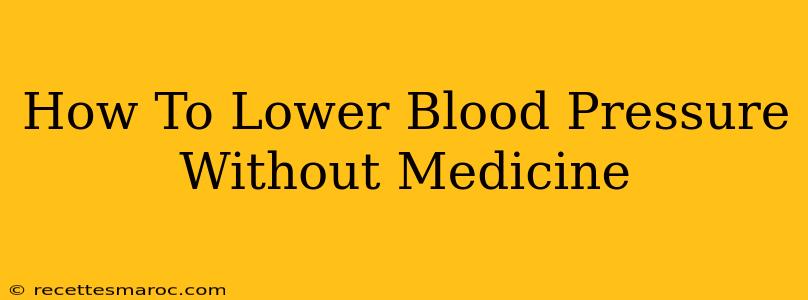High blood pressure, or hypertension, is a serious health concern affecting millions worldwide. While medication is often necessary to manage severe hypertension, many individuals can successfully lower their blood pressure naturally through lifestyle modifications. This guide explores effective strategies to achieve this goal, empowering you to take control of your heart health.
Understanding the Importance of Lowering Blood Pressure
Before diving into the methods, let's understand why lowering blood pressure is crucial. High blood pressure puts extra strain on your heart and blood vessels, increasing the risk of:
- Heart attack: High blood pressure damages arteries, leading to blockages that can cause heart attacks.
- Stroke: The pressure can rupture blood vessels in the brain, causing a stroke.
- Kidney disease: High blood pressure damages the kidneys' filtering system.
- Heart failure: The heart struggles to pump blood effectively under constant high pressure.
Lifestyle Changes to Lower Blood Pressure Naturally
Implementing these lifestyle changes can significantly reduce your blood pressure and improve your overall health:
1. Dietary Adjustments: The Cornerstone of Natural Blood Pressure Control
- DASH Diet: The Dietary Approaches to Stop Hypertension (DASH) diet emphasizes fruits, vegetables, whole grains, lean protein, and low-fat dairy. It's proven highly effective in lowering blood pressure. Focus on potassium-rich foods like bananas, spinach, and sweet potatoes, which help counter the effects of sodium.
- Sodium Restriction: Limit your sodium intake. Read food labels carefully and avoid processed foods, fast food, and excessive use of salt in cooking. Aim for less than 2,300 milligrams (mg) of sodium per day, and ideally less than 1,500 mg.
- Potassium-Rich Foods: As mentioned, potassium helps balance sodium levels. Incorporate plenty of potassium-rich foods into your diet.
- Limit Saturated and Trans Fats: These unhealthy fats contribute to high cholesterol, further increasing blood pressure. Choose lean meats, poultry without skin, and avoid fried foods.
2. Exercise: A Powerful Tool for Blood Pressure Management
Regular physical activity is essential. Aim for at least 150 minutes of moderate-intensity aerobic exercise or 75 minutes of vigorous-intensity aerobic exercise per week. This could include brisk walking, jogging, swimming, cycling, or any activity that gets your heart rate up. Strength training is also beneficial, helping build muscle mass and improve overall cardiovascular health.
3. Stress Management Techniques: Mind Over Matter
Chronic stress significantly elevates blood pressure. Incorporate stress-reducing techniques into your daily routine:
- Deep breathing exercises: Practicing deep breathing can calm your nervous system and lower blood pressure.
- Yoga and meditation: These practices have been shown to reduce stress hormones and lower blood pressure.
- Spending time in nature: Connecting with nature can have a calming effect on the mind and body.
4. Maintain a Healthy Weight:
Obesity is a major contributor to high blood pressure. Losing even a modest amount of weight can significantly lower your blood pressure. Focus on a balanced diet and regular exercise to achieve a healthy weight.
5. Limit Alcohol Consumption:
Excessive alcohol consumption raises blood pressure. If you drink alcohol, do so in moderation. For healthy adults, this means up to one drink per day for women and up to two drinks per day for men.
6. Quit Smoking:
Smoking damages blood vessels and increases blood pressure. Quitting smoking is one of the best things you can do for your overall health, including lowering your blood pressure.
7. Get Enough Sleep:
Lack of sleep can negatively impact blood pressure. Aim for 7-8 hours of quality sleep each night.
When to Seek Professional Medical Advice
While these lifestyle changes can be highly effective, it's crucial to consult your doctor before making significant dietary or exercise changes, especially if you have pre-existing health conditions. Regular blood pressure monitoring is essential to track your progress and ensure your blood pressure remains within a healthy range. If your blood pressure remains high despite lifestyle changes, your doctor may recommend medication. Don't delay seeking medical attention if you experience symptoms like severe headaches, dizziness, or shortness of breath.
Disclaimer: This information is intended for educational purposes only and should not be considered medical advice. Always consult with your healthcare provider before making any changes to your diet or exercise routine, or if you have concerns about your blood pressure.

